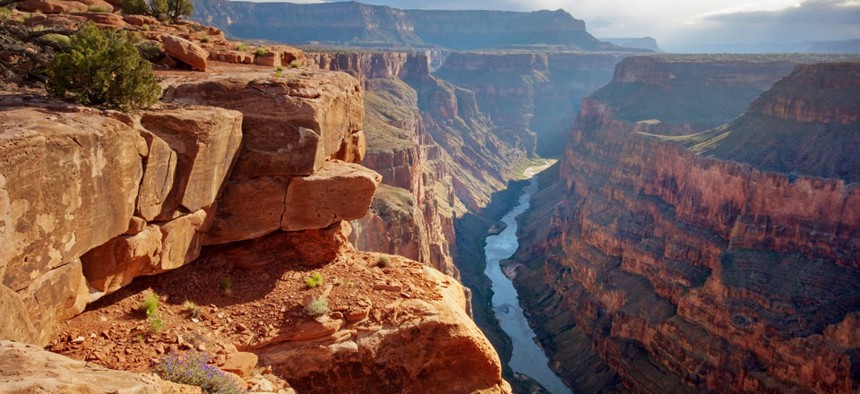
Grand Canyon National Park Sumikophoto/Shutterstock.com
House GOP Wants to Make It Nearly Impossible for Obama to Create New National Monuments
Critics have dubbed the bill the 'No More Parks Act.'
The House will vote Wednesday night to assert its authority over the executive branch, likely passing a bill that would revamp a 108-year-old law that would make it harder for President Obama to declare national monuments on federal lands.
The situation reminds us of an early episode of West Wing (Season 1, Episode 8, "Enemies," to be exact). Just as the Bartlet administration is on the cusp of passing a sweeping banking-reform bill, two senators on the Banking, Housing, and Urban Affairs Committee attach a rider that would allow strip mining on federal lands that cover half the state of Montana. After arguing whether to swallow the mining provision or veto the entire banking bill, Bartlet's deputy chief of staff, Josh Lyman, finds the perfect solution to protect Big Sky: the Antiquities Act.
The 1906 law, used so cleverly in West Wing, allows the president to unilaterally declare large swaths of federal lands as national monuments. Not long after the bill passed Congress, Theodore Roosevelt used the Antiquities Act to establish the Grand Canyon National Monument, which later became Grand Canyon National Park (seen in all its glory here). The legislation has since been used to create the Statue of Liberty National Monument and dozens of others.
But the law is far too sweeping, House Republicans argue, because it allows administrations to protect federal lands without considering the wishes of local citizens and governments, not to mention Congress.
The administration on West Wing is hardly the first to use the Antiquities Act to circumvent the wishes of Congress. The uproar that followed Roosevelt's establishment of Jackson Hole National Monument in 1943 resulted in congressional uproar and eventually a 1950 law preventing the president from creating any national monuments in the state of Wyoming without express approval from Congress. There's a similar law on the books pertaining to Alaska, enacted after former President Carter declared 17 monuments there totaling 56 million acres on a single day in 1978.
Now the House is pushing legislation that would significantly curb it. The Ensuring Public Involvement in the Creation of National Monuments Act, sponsored by Rep. Rob Bishop, R-Utah, would require federal agencies to do an environmental study and interview local citizens who would be affected by any national-monument declaration before the president can take action. It would also limit the president to creating just one national monument per state in a four-year term and require a study on the economic impact of turning such land into a national monument.
Significantly, the law does provide an "emergency exemption" that would allow the president to protect less than 5,000 acres of land in areas that face "an imminent threat to an American antiquity." But the provision would only last for three years, unless Congress approves it for permanent protection.
The bill's opponents have dubbed it the "No More Parks Act," noting that the qualifications for protecting federal lands are so high as to be prohibitive. Proponents note that only Congress can create a national park. This legislation deals with national monuments, which are similar, but have different funding and management and lack the amenities of national parks. They're also, generally, much smaller.
Obama is expected to veto the measure if it reaches his desk, though the bill isn't likely to pass the Senate anyway.
Why House Republicans are pushing the bill now, more than 100 years after the law passed Congress, is interesting question. Many have pointed to Obama's designation earlier this month of 1,665 acres of federal lands in Northern California as part of the California Coastal National Monument. But the House already agreed to that proposal on a unanimous vote. That bill was sponsored by Rep. Jared Huffman, D-Calif., but had yet to gain any traction in the Senate, where the administration's federal nominees and aid to Ukraine have taken a priority.
The issue is not entirely about safeguarding federal lands. Rather, the House vote is about the legislative branch asserting its power. Obama declared in his State of the Union address this year that he would "use [his] authority to protect more of our pristine federal lands for future generations." And as with many other issues, House Republicans are intent on preventing the executive branch from overstepping that authority.







